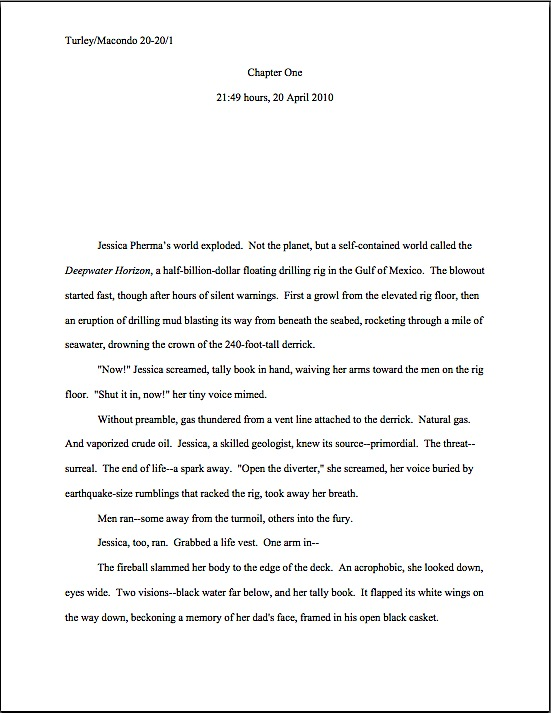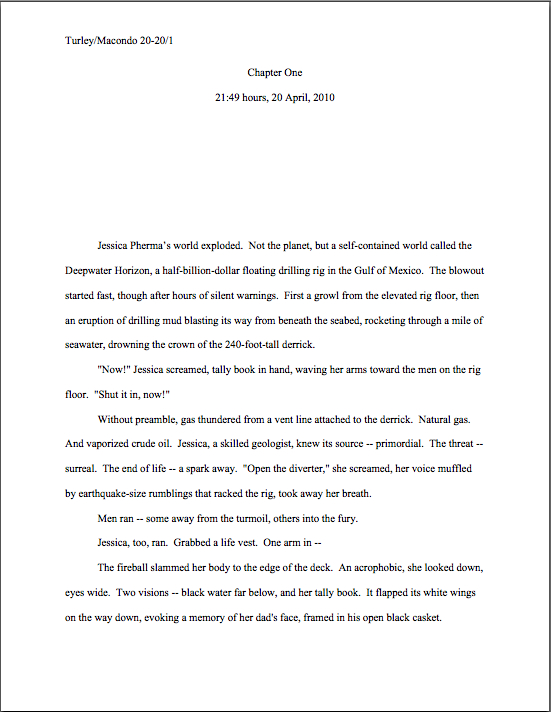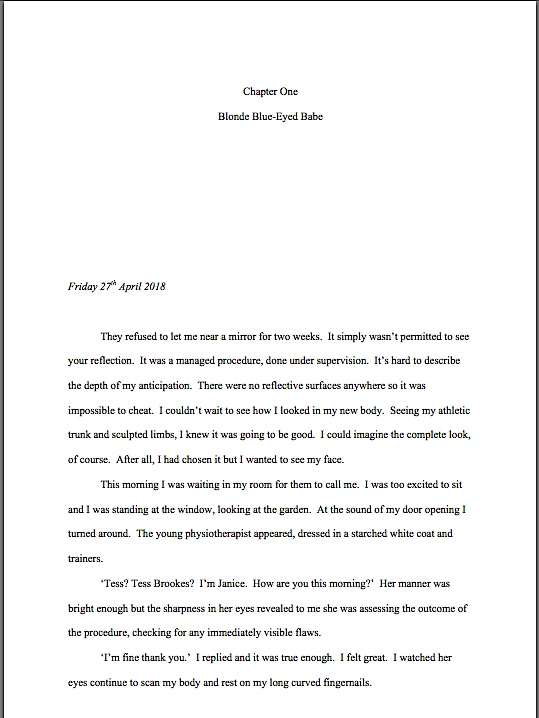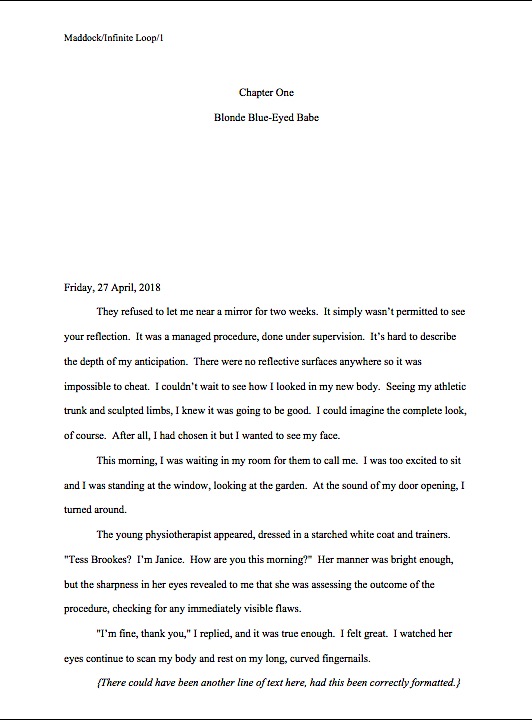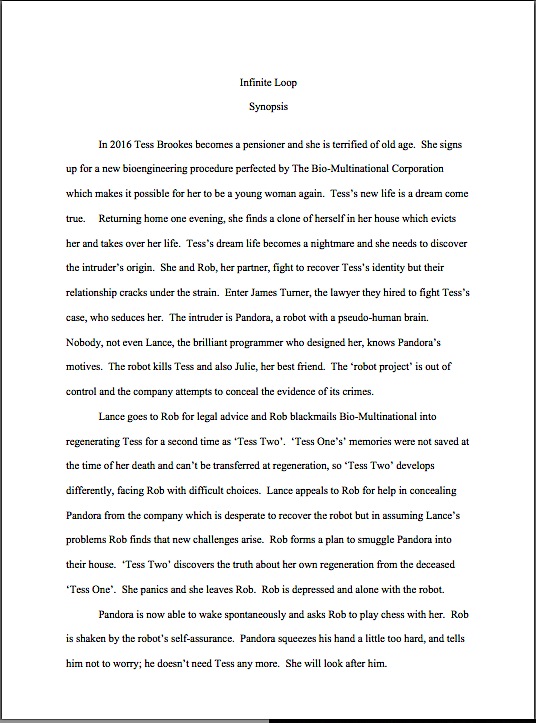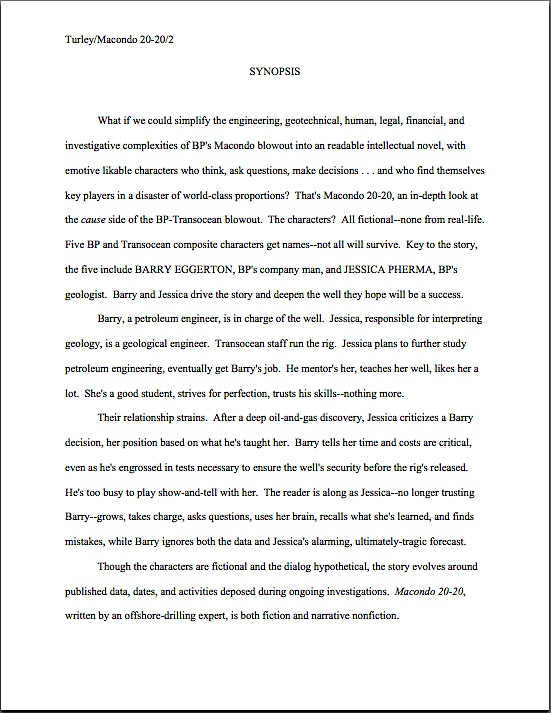Okay, I’m just going to accept it: the universe has been conspiring to slow this series down. Not to a crawl, by any means — have you been enjoying my posting on a daily basis again, Author! Author! habitu?s? — but not at the accelerated, oh-my-God-the-deadline-for-the-William Faulkner/William Wisdom Literary Competition-is-next-Monday (yes, really) pace I had anticipated.
Had I mentioned that there are cash prizes? And that I shall be there to shake the winners’ hands at this year’s award ceremony?
I shall press on as swiftly as I can — including, those of you planning to enter that particular contest this year (not that I’m trying to influence you or anything) will be glad to hear, a close examination of its entry guidelines over the weekend — but before I launch into today’s topic, I am going to pause for just a moment.
It’s more than worth it, for I have joyous news to report: D. Andrew McChesney, Author! Author!’s very first commenter, blogger, and a genteel fellow better known in these parts as Dave, has released his first novel, Beyond the Ocean’s Edge today! Congratulations on the successful completion of a long and fruitful voyage, Dave!
Just between us, I’m hoping to blandish our Dave to share his thoughts on the publication process with us later this month. As you may recall, he was generous enough to write a guest post last September on the ins and outs of self-publishing, a piece that provoked quite a bit of fascinating discussion. I am an inveterate blandisher, so I suspect I shall succeed.
I’m also an inveterate cheerleader for good writers’ work, so allow me to add: you may purchase the book here. And would I deprive you of the blurb?
Hotchkiss continued on. “Ed! You didn’t see it?” The use of his captain’s first name on deck attested to the first lieutenant’s growing apprehension and maddening confusion.
“See what, Isaac, my old friend?” Pierce recognized his comrade’s state of mind and did not correct his lapse of quarterdeck etiquette. Clearly, a more personal and comfortable approach was needed.
“The stars! The stars, sir! We weren’t just looking up at ‘em. We were amongst them. There was the sea, and then there wasn’t. An’ the stars were below us as well! And we were there, right among them, like we were the stars themselves, or the moon, or. . .”?
“I’m sure you saw what you’ve described. Unfortunately, I chanced not to see it, although I have had a strange feeling of timelessness.”?
Is it possible to sail beyond the ocean’s edge to another world? In 1802, Royal Navy Lieutenant Edward Pierce is ashore on half-pay because of the Peace of Amiens. He fortunately gains command of a vessel searching for a lost, legendary island. When the island is found, Pierce and his shipmates discover that it exists in an entirely different but similar world. Exploring the seas around Stone Island, HMS Island Expedition sails headlong into an arena of mistaken identities, violent naval battles, strange truces, dangerous liaisons, international intrigue, superstition, and ancient prophecies.
I’m not saying that I’m excited about this, mind you. I’m saying that I’ve already ordered my copy and already have a pencil ready to take notes for my Amazon review. (One of the nicer things a writer can do for a fellow keyboard-tapper, by the way, and something I hope you take the time to do for your favorite living authors.)
Aglow with that fine resolution, let’s move onward and upward. I’ve spent the last week talking about the various types of literary contest that an agent-seeking writer might conceivably want to enter. Today and tomorrow, I’m going to concentrate on an aspect of contest entry that seems to frustrate nearly every entrant: the synopsis.
Already, the chorus of groans shakes the skies. And frankly, I can’t say that I blame those of you who feel that way about churning out a synopsis, especially on a tight deadline. Like, say, in time to be postmarked Monday.
I hate to be the one to break the bad news (yet how often I seem to be), but just as synopsis-writing is a necessary evil of querying and/or submitting to an agent, if you are entering a category that covers book-length material, you will pretty much always be asked to include a synopsis. And while you’re already braced, let me rip off the Band-Aid quickly to add: since contest rules often specify an overarching page limit intended to cover both the submitted manuscript pages and a synopsis for the whole book, many entrants yield to the temptation to skimp on this important part of the contest puzzle.
What do I think of this strategy? To summarize what promises to be a couple of long posts’ worth of advice in a word: DON’T.
Contrary to widely-held writerly belief, a synopsis typically weighs more heavily in a contest entry’s success than in a submission packet agent, not less. Not to give away trade secrets or anything, but synopses tucked inside submission packets are not always read. Those accompanying query packets usually are, if our pal, Millicent the agency screener, feels that the query letter shows promise, but generally speaking, she will hop directly to the manuscript in a submission packet.
So which submission synopses tend to get read? Well, if the agency requested a partial, and Millie likes those pages, she will frequently glance at the synopsis before asking to see the rest of the book. Or, if her boss asked to see the whole thing, she might read the opening pages — and then, if she likes what she sees, take a peek at the synopsis. Or not.
Which is to say: not very many actually get read. The agent of your dreams will almost certainly want to have one at her elbow when she picks up the phone to pitch your work to editors, however. And that means — you’re sitting down by now, right? — that the more books you write over the course of your agented life, the more synopses you are going to have to write.
Had I mentioned that most writers, agented and pre-agented alike, consider the task a necessary evil?
The synopsis that accompanies a contest entry, on the other hand, virtually always receives some critical attention at judging time. That means — and you might want to rush into the kitchen and grab some dry crackers to munch; the nausea might come on suddenly — that every syllable of a contest synopsis is as important as any passage in your entered pages.
Actually, if you write it well, it might be even more important. Since so many perfectly lovely writing contest entries are marred by an obviously tossed-together synopsis, a well-constructed one tends to leap out at the judges, shouting, “Pick me! Pick me!”
Last year, I spent a month of posts on the ins and outs of writing a strong synopsis. (Now well hidden under the startlingly opaque category title HOW TO WRITE A REALLY GOOD SYNOPSIS. Why oh why do I not make these things easier to track down?) Heck, I even devoted some serious attention to the most hated specimen of the species (and the one most necessary for anyone thinking of entering a book-length work in the aforementioned Faulkner/Wisdom competition), the 1-page synopsis.
Following my tradition of concealment, I have secreted those posts under the code name HOW TO WRITE A 1-PAGE SYNOPSIS. But don’t tell anyone I told you.
Unless any of you kick up a hue and cry, demanding that I revisit the issue now in very great detail (anyone? Anyone?), I’m going to proceed on the assumption that most of you have already mastered the basics of writing an (ugh) synopsis. For the next couple of days, I would like to focus on the differences between a synopsis that might wow a Millicent and one that might impress a contest judge.
In answer to that deafening unspoken question my readership just flung in my general direction: yes, I am indeed suggesting that you write two separate synopses, one to accompany contest entries, and one to send out with your query and submission packets. Got a problem with that?
Judging by the widespread rending of garments and troubling of heaven with bootless cries on the subject of all of the extra work that would entail, I gather that you do. Hear me out, please. Most contest synopses read as though their authors regarded them as — get this — an annoying nuisance to be polished off as quickly as humanly possible, much in the same manner as a child will gulp down a hated vegetable his parents have told him he must eat, simply in order to clear it from his plate.
And this, frankly, mystifies Millicent’s Aunt Mehitabel, the veteran contest judge. “If I didn’t know better,” she clucks over hundreds of entries every year, “I would think that these writers were laboring under the impression that the writing there were not being judged, too, in addition to the writing in the entry proper.”
Oh, Hitty, if only you were sitting where I am, hearing thousands of prospective contest entrants suck in their breath sharply in surprise. An astonishingly high percentage of entrants seem to be unaware that the synopsis is part of the writing being evaluated in a contest, just as in a submission.
And that, breath-suckers, is strategically unwise. I’ve said it before, and I shall no doubt say it again: every word of your writing that passes under the eyes of a professional reader is a writing sample. Treat it accordingly.
Another common Mehitbel-mystifier involves submitting a too-terse synopsis, presented in what is essentially outline form. (Sometimes, writers present it literally in outline format, believe or not.) Short on the sensual details and plot twists that enliven a story, these just-the-facts-ma’am synopses give no indication that the author is a talented storyteller. Just that she is darned good at making lists.
See my note above about every word of an entry being a writing sample. I’m going to keep repeating that depressing truth until everyone within the sound of my voice believes it.
What makes me think that most contest entrants don’t currently believe it? How about the frequent practice of lifting entire phrases, sentences, and even paragraphs from the entry itself and plopping them down in the contest synopsis, as if the judge isn’t going to notice?
After our recent series on structural repetition, I sincerely hope that last question made you laugh out loud. Chant it with me, campers: professional readers like judges are born nit-pickers: they’re going to notice.
It’s also becoming increasingly common to conflate a screenplay synopsis — which typically has separate headings for action and major characters — with a literary synopsis. How might one define the latter? Here goes:
A book synopsis is a linear narrative concerned with plot for fiction and structure for nonfiction, a brief exposition in the present tense of the story of a novel or the argument of a book. Usually, in a fiction or memoir synopsis, a character’s name will be capitalized the first time it appears, followed by the character’s age in parentheses: GEORGE (13). Typically, synopses run from 1-5 pages (double-spaced), depending upon the requirements of the requesting agent, editor, or contest.
In other words, it’s our old bugbear, a 
In more other words, not everything labeled synopsis is the format that contest judges expect. In yet a third set of words: remember how I mentioned yesterday that there are certain problems that prompt judges to slide an entry prematurely into the non-finalist pile as soon as they appear? A screenplay-style synopsis is one of ‘em.
Why? Well, it makes it so very apparent that the entrant has not learned the norms of the literary world — and believe I may have mentioned several dozen times throughout the course of this series, one of the things being evaluated in a literary contest is a book’s marketability. To put the prevailing logic bluntly, the vast majority of judges will prefer an entry that is professionally presented — that is, one that adheres to standard format and resembles what a top-notch agent would expect to see in a successful submission — over even a brilliantly-written submission that does not conform to those standards.
To translate that into practical terms, few judges are going to be willing to waste finalist space on an entry that flouts the expectations of submission. They want to promote writing that has a fighting chance in the marketplace.
Seriously, I’ve seen this criterion included on judges’ rating sheets. Please, I beg of you, do not fall into the pervasive trap of believing that literary contests are the last haven of writing for its own sake. For contests that accept book-length work, that’s seldom the case.
Another type of synopsis that tends to elicit a knee-jerk reaction from Mehitabel: one that does not summarize the plot or argument of the book at all. Instead, it reads like promotional copy: This is the best book about the undead since Interview with the Vampire! This cookbook will change cuisine as we know it!
Or, even more common: This is the moving, insightful, beautifully written story of two kids in love, a modern-day Romeo and Juliet. You’ll laugh; you’ll cry; you’ll want to call up your high school sweetheart to reminisce.
Clearly, this entrant has confused a synopsis with a back-jacket promotional blurb. Judges are seldom amused by this, for precisely the same reason that Millicent tends not to be: they want to make up their own minds about how well-written/important/marketable/likely to induce drunken dialing a piece of writing is, not have it announced to them.
So what quality in a contest synopsis that the writing is good/important/market-ready/conducive to poor judgment? Once again, an old nag trots from the writing advice stable to admonish us all: showing, not telling, in the synopsis is the best way to demonstrate the high quality of your writing.
Again with the bootless cries? What now? “But Anne,” many of you protest, waving your boots around, “a synopsis is so short! I barely have time to tell my story, much less show it!”
Relax, garment-renders. There are a few tricks of the trade; we’ll be getting to them soon.
But first, let’s note one more frequent strategic error, a phenomenon often seen in query packet synopses as well: devoting virtually the entire synopsis to the premise of the book. Unbelievably often, this tactic leads to the exclusion of the major conflicts, mention of the major characters, or — in a synopsis longer than a page or two — any indication of the story arc or ending.
The usual authorial justification for this, of course, is I don’t want to give the ending away. Understandable, of course — were these writers not asking the judges to recognize the high quality of books that they had the luxury of reading in their entirety. Most contests that give awards for long-form writing, however, call for only the opening pages and a synopsis.
So is it completely unreasonable for the judges to want to be provided with proof that the author has at least thought through the ending of the book, as well as the beginning? Or — and you’d be astonished at how often this turns out not to be the case — that the manuscript they are considering for an award has actually been written to completion.
For a nonfiction work, of course, entering an incomplete manuscript in a chapter + synopsis contest would make some sense: the logical time to enter a contest is when one is circulating the book proposal, right? Naturally, though, someone who has written a book proposal will already produced an Annotated Table of Contents, demonstrating the story arc of the proposed book. Mehitabel certainly has a reasonable claim to deserving to know what that is.
For a novel — which, as I hope everyone is aware, is expected to be completely drafted before the novelist begins to query it — that claim rises to the level of a right. Mehitabel needs to know whether the author of the entry before her not only can write, but can structure an entire book.
Of course, any entrant is free to interpret the synopsis requirement as s/he pleases. It’s only fair to tell you, though, that in every contest I’ve judged, none of stripes of synopsis I’ve just mentioned would have made it to the semifinalist round, much less been seriously considered for the top prize. And that’s wasn’t my independent call: those were the rules. I just mention.
As if all that weren’t enough to make even the bravest first-time contest entrant tremble like a leaf at composition time, contest synopses often need to be shorter than submission synopses. That means, often, that writing them is harder.
Why? Well, most contest entries set absolute maximum page limits. Page space will be at a premium, therefore. For instance, if the chapter you want to submit is currently 23 pages long, and the page limit (exclusive of title page, which is never counted in a contest’s maximum page count) is 25, you’re either going to need to shorten your already-existing synopsis to 2 pages or make some serious cuts to your chapter to permit something longer.
Guess which option most contest entrants pick? You guessed it: contest judges see many, many single-page synopses.
Unless the contest rules actually call for it to be that short, however, those synopses tend to lose style points for the entry. After all, as many of you howled at me earlier in this post, it’s awfully darned difficult to tell the story of a reasonably complex book within a couple of dozen lines of text.
Even if the contest rules specify a super-short synopsis (or make it sound shorter by calling it a plot outline), though, please do not give into the quite substantial temptation to fudge a little to stay within the specified parameters. Even if you have been asked to produce a 3-paragraph synopsis of a 500-page book, DO NOT single-space it, shrink the print size, or fudge the margins to make it fit within the specified limits, unless the contest rules say you may.
Why am I being so adamant about this? Simple: if you do it, you will get caught and penalized.
It’s kind of a no-brainer for the judge, actually. Trust me, if the rest of your entry is in 12-point Times New Roman with 1-inch margins, double-spaced, almost any judge is going to be able to tell right away if your synopsis’ margins are .8″ all around. Or if the type is shrunk to 95%.
The same holds true, incidentally, if you submit a super-long synopsis. Because judges are expected to rate entries for professional presentation, unless contest rules specify otherwise, it’s prudent not to allow a contest synopsis to run over 5 pages or under 2.
Why those limits? A synopsis that is much shorter will make you look as if you are unable to sustain a longer exposition; if it is much longer, you will look as though you aren’t aware that a 3- to 5-page synopsis is fairly standard in the industry.
If this is starting to sound a bit repetitious, congratulations — you’ve grasped a fundamental truth about literary contests. An entry’s synopsis, just like its chapter(s), is subject to judging for clarity, coherence, marketability.
Oh, and professionalism. Had I mentioned that?
Which is why a synopsis that reads like — wait for it — a synopsis will virtually always receive higher marks than one that sounds like a back-jacket blurb (My writing teacher says this is the best novel since THE SUN ALSO RISES!) or an exposition on why the author chose to write the book (It isn’t autobiographical, but”?).
Instead, if you are entering a fiction category, make sure that the novel sounds engaging, marketable — and like the best yarn since TREASURE ISLAND. For a memoir, ditto. And for other nonfiction, present the argument as fascinating and rigorously supported.
But use the synopsis to show that your book is all of these things, not to tell about it.
Admittedly, summarizing a 400-page book in just a few pages that’s a fairly tall order. No one contests that. You’re going to need to cover that plot or argument with dispatch. But that doesn’t necessarily mean being vague or leaving out eye-catching details.
Oh, stop groaning. That’s going to be true of your first few attempts at writing a synopsis, no matter the context in which it is requested. But, unlike many of the other hoops through which aspiring writers need to jump through on the way to landing an agent, the ability to write a strong synopsis is a skill that’s going to serve you well for your entire literary career.
Don’t pretend you didn’t hear me the first time. Pull out your hymnals and sing it out: even the long-agented and often-published still need to write ‘em occasionally. Might as well learn to do it well.
In both contest and submission synopses, most fiction writers make the mistake of summarizing the plot in generalities, rather than — got a pencil handy? You’re going to want to take notes — giving a brief overview of the major conflicts of the plot through a series brief, vividly described scenes redolent with juicy, concrete details.
Not clear on the difference? Let’s take a gander at a fairly typical opening paragraph for a synopsis:
JACQUELINE (42) is experiencing severe problems in her life: a boss who alternately seems to hate and praise her, a father who calls all the time to grill her about her love life, and a wacky neighbor who is constantly knocking on her door to borrow things. She feels like she’s going out of her mind until she meets the man of her dreams, an architect whose bedroom eyes make her swoon, but who may already have a wife. After a series of disturbing “chance” meetings with Josh, she finds that it’s easier to accept a temporary demotion than to keep on fighting battles on all fronts.
Okay, let me ask you: how many lines into that summary did your attention start to wander? How many lines before you started to become confused about what was going on? And if you made it all the way to the end, did you find yourself wondering whether Josh was the architect, the boss, or the neighbor?
And what the heck was up with those quotation marks around something that clearly wasn’t spoken aloud?
Good; you’re thinking like an agency screener. And like a contest judge.
Why doesn’t this excerpt doesn’t hold the attention? It’s stuffed to the gills with generalities and clich?s. But a synopsis does not need to resort to either. Take a look at the same premise, summarized with a bit more pizzazz and a lot more specifics:
Freshly-divorced graphic designer JACQUELINE (42) is finding it hard to sleep these days. Staying awake isn’t much of a picnic, either. Her boss, ALBERT (87) cannot seem to make it through a staff meeting at the magazine without criticizing her layouts while running a warm, greasy hand up her stockinged thighs under the conference table.
You already want to read this contest entry, don’t you? So will Mehitabel. That’s because the details are compelling and unusual.
Oh, you want to see that magic trick again? Okay, let’s see where else dialing back the vague helps us:
Every morning at precisely 9:24, her habitually-marrying father (OWEN, 67) telephones her at work to see if she met Mr. Right the night before — and when she sheepishly says no, he regales her with tales of his latest paramour. Even her nights are disturbed by her lonely neighbor, CLIVE (24), who can’t seem to make it past midnight without scratching on her door to ask to borrow something — her milk, her hairdryer, her cat.
She manages to run carefully-balanced chaos of her life runs with relative smoothness until dreamy, suspender-wearing architect JOSH (48) comes to measure her office for long-overdue renovations. But does that untanned line on his left ring finger mean that he, too, is recently separated — or that he’s the kind of rat who slips his wedding ring into his pocket every time he comes within smoldering range of an attractive woman?
Yes, this second synopsis is a trifle longer, but aren’t those few extra lines worth it, when they give the story so much more oomph? Oomph is, after all, important in a contest entry.
A contest judge, like an agency screener, typically reads quite a few entries within a single sitting. If you want yours to end up in the pile with the finalists, you’re going to want that judge to remember the story or argument of your book, as well as the quality of the writing.
Remember them for positive reasons, that is. If your synopsis doesn’t cause Mehitabel to make a mental note to rush out and buy that book the nanosecond it hits the shelves, it may be lacking something in the oomph department.
Do I see a raised hand or two out there? “But Anne,” I hear some of you asking, “wouldn’t everything you’ve just said be applicable to either a submission or a contest synopsis? I thought we were talking about contest synopses specifically.”
Good point, ethereal questioners. Yes, these principles would apply equally well to either type of synopsis. However, for a contest synopsis, since you will also be submitting the opening of the book — even if the rules merely say that you should include A chapter, rather than specifying Chapter 1, you’re pretty much always going to be better off submitting the beginning — you can get away with covering those early pages only very lightly in the synopsis.
Actually, since those opening 10 pages (or 15, or 25) are all that the judges are going to see of the book, you would be well within your rights to streamline the plot more than you might for a regular synopsis. You could also — you’re still sitting down, right? — lose a subplot or two.
Stop glaring at me: your job here is not to present Mehitabel with a morbidly accurate summary of every aspect of the book, but to convince her that the manuscript it represents contains an enjoyable, well-written story or argument. If you can construct a more vivid, compelling story by sticking to only the book’s primary plotline (which, in a short synopsis of a long novel, is often the case), go ahead.
The point of the contest synopsis, after all, is to wow the judges with what a great storyteller you are, not to reproduce every twist, turn, and minor character’s angst. This may feel a touch misleading, but after you are wearing the first place ribbon, no one is going to come running up to you crying, “?Hey! Your synopsis left out three major plotlines, and didn’t mention the protagonist’s sister! Foul! Foul!”?
Trust me on this one. I hear contest judges yell things all the time.
For memoir, it’s especially important to streamline the story. Why? Well, most memoir contest synopses include a little too much information extraneous to the primary plotline. For the synopsis, hit only the dramatic high points — and make sure to give some indication of how the main character grows and changes throughout the book.
Yes, I’m talking about you, memoirist. You hadn’t been thinking of yourself as your own protagonist? Mehitabel and Millicent will.
Oh, and avoid making the common mistake of mentioning in either a contest or submission synopsis for a memoir that the story being told here is true. Actually, you should eschew it in a query, too: in publishing circles, all nonfiction is assumed to be based upon truth.
Just ask James Frey, he of the A MILLION LITTLE PIECES scandal.
Seriously, the true memoir is as much of an pet peeve as the fiction novel or the nonfiction how-to book. To the ears of the industry — and to contest judges that pay attention to publishing norms — all of these terms are redundant.
For other non-fiction entries, you’re going to want to reproduce the basic argument of the book in the synopsis. Try starting with a thought-provoking question (In a society as complex as America’s, why isn’t there more social acceptance of squirrel-lovers?), then moving on to why that question is important enough to answer. Present the essential planks of your argument in logical order, and give some indication of the kind of evidence you intend to use to back it up.
But again, remember to be specific in your overview, not vaguely general. Remember, just as Millicent does not have time to fill in any logical holes in a query, Mehitabel neither has the time nor is allowed to project her notions of what your book is about onto your entry. Sing it out, series-followers: a contest judge must evaluate an entry based solely upon what is on the page. Don’t expect a lenient reading.
I hear some throat-clearing out there. “Um, Anne? Again, dandy advice for either kind of synopsis, but how should I handle nonfiction in a contest synopsis in particular?”
Tenacious, aren’t you? I can refuse you nothing.
In a contest synopsis for any kind of nonfiction book (including a memoir), it is usually a good idea to include some brief indication of the target market and why your book will serve that market better than what is currently available. Essentially, you’re giving Mehitabel a free taste of the argument that you will be making in your book proposal.
Do keep it short and to-the-point, though. Hyperbole does not work well in this context, so steer clear of grandiose claims (Everyone in North America will want to buy this book!) and stick mostly to explaining (in vivid, specific terms, please) what the book is about.
But most of all, make sure that the synopsis makes the book sound like a great read. If Mehitabel doesn’t want to place an order for your as-yet-unpublished book, believe me, your contest entry is not going to make it to the finalist round.
As with a novel or memoir’s story arc, the best way to achieve this in just a few pages may well involve leaving out some of the less important planks of your argument. Do not feel compelled to give the chapter-by-chapter summary you would in a book proposal. Just because you spend 80 pages on the spiritual life of tadpoles in your book on frogs doesn’t necessarily mean than a description of it will read well in a contest synopsis.
That use of specifics made your eyes light up, didn’t it, coming after those two generalizations? It would for Millicent, too.
See now why you might benefit from writing one version of the synopsis for agents, and another, more streamlined one that gets tucked into contest entries? Different contexts — and sometimes even different contests — may call for different approaches.
Flexibility, after all, is as important a component of the writer’s tool bag as the ability to write an eye-catching opening paragraph. Don’t worry that a judge is going to assume that you don’t understand how to write a submission synopsis — a contest entry is a different animal, and everyone concerned understands that.
Next time, I shall give you a few more pointers on how to make that synopsis appeal a bit more to contest judges. As if that weren’t enough to set a contest entrant’s heart aflutter, I shall be showing visual examples of how a synopsis should be formatted.
Oh, the excitement is palpable. Keep up the good work!



